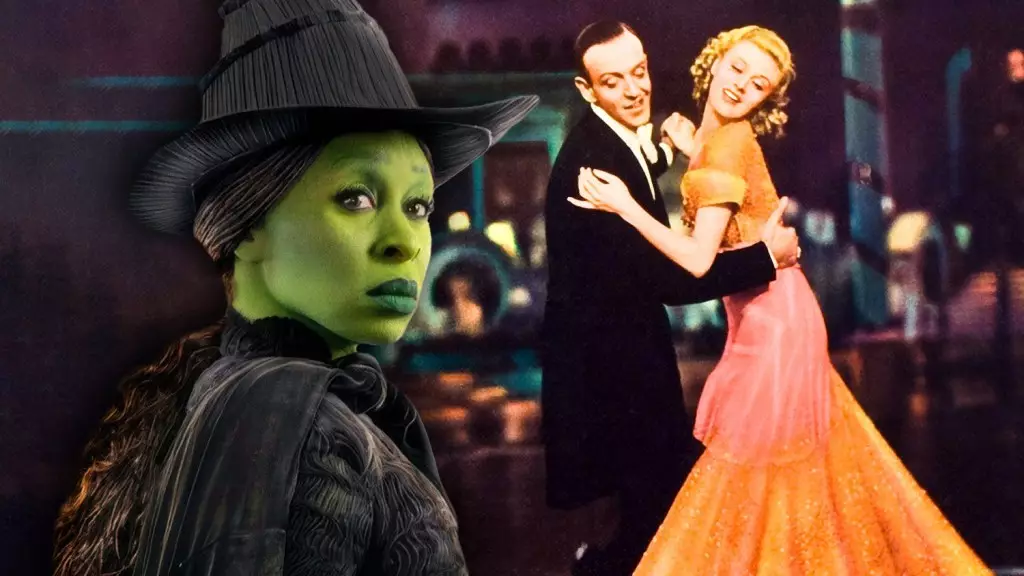The Covid-19 pandemic served as a temporal reset for many, leading countless individuals to find solace in the vibrant artistry of classic MGM musicals. These films allowed audiences to escape their tumultuous reality, celebrating the comfort and nostalgia found in the likes of *Singing in the Rain* and *Top Hat*. However, as we find ourselves in a new era of musicals, it is crucial to examine the evolution of this art form, noting the tonal shifts and thematic complexities that have emerged alongside its revival. This new cycle of musical films has shown remarkable commercial success, but a closer inspection reveals their narratives often tread darker, more intricate waters than their predecessors.
Recent musicals are garnering award nominations and financial success, as indicated by *Wicked* grossing over $500 million. Prominent stars such as Timothée Chalamet, Selena Gomez, and Cynthia Erivo have once again brought songwriting to the forefront, but the tonal shifts in their narratives reflect a significant evolution. While the traditional musicals were often filled with lighthearted escapism and cheerful characters, these newer stories delve into the complexities of human existence, pushing the boundaries of what a musical can convey.
The now complex characters in new musicals reflect the tumult of contemporary society. Gone are the days when protagonists like Gene Kelly and Fred Astaire presented a carefree existence with romance as their sole conflict. The characters created today demand a more profound exploration of their psychological and emotional states, which may not always lend themselves to joy. For example, Chalamet’s portrayal in *Wonka* captures a depth that his lighthearted predecessors rarely achieved.
The inherent complexity of modern protagonists can be vividly illustrated by examining key performances in the recent wave of musicals. In *Emilia Pérez*, Gascón and Gomez’s characters navigate the dangerous waters of dealing with a Mexican cartel, showcasing not just a personal journey but also the socio-political ramifications of their environment. It’s a far cry from the whimsical fantasies delivered by classic characters like Leslie Caron in *Gigi*. This dichotomy between the light sophistication of bygone musicals and the gritty realism of today underscores a cultural shift in storytelling.
Angelina Jolie’s portrayal of Maria Callas also illustrates this modern complexity, as she embodies a star grappling with the weight of her past and the expectations of her present. Unlike the carefree dancers of yore, these characters face existential questions and profound emotional hurdles that resonate with an audience bearing the weight of contemporary realities.
Furthermore, the genre’s possibilities extend beyond traditional narratives, as seen with projects such as *Babygirl* and *Nightbitch*. These titles hint at a depth yearning for lyrical exploration, suggesting that music can continue to evolve as an integral part of storytelling—beyond mere background melodies. Even adaptations from non-musical titles into lyrical formats indicate a growing recognition that musical storylines have farther-reaching implications in personal and societal contexts.
However, despite their increased complexity, the stark contrast with the clearly defined, feel-good narratives of the past prompts a valid question: can joy and profundity coexist within these stories? Audiences may still yearn for musical escapism, leading to a push-and-pull between vibrancy and realism in narrative choices.
As we navigate this multifaceted renaissance of musicals, it is essential to embrace both the complexity of modern storytelling and the joy that classic components can still offer. The pathway forward involves a balancing act—where inviting melodies meet intricate human experiences. No longer do we have to settle for a concept of what musicals should portray; it is time to celebrate this eclectic evolution while welcoming its potential to provoke thought and stir emotions. In merging the nostalgic charm of the past with the sophisticated nuances of contemporary storytelling, we witness the evolution of the musical genre into uncharted territories.


Leave a Reply